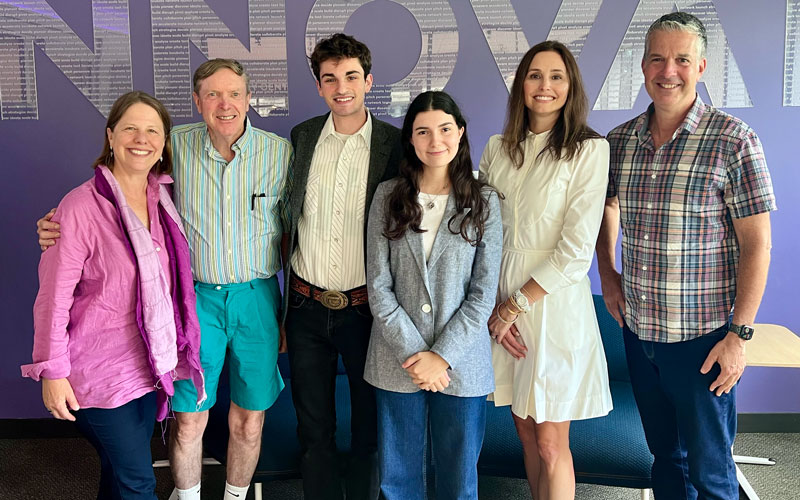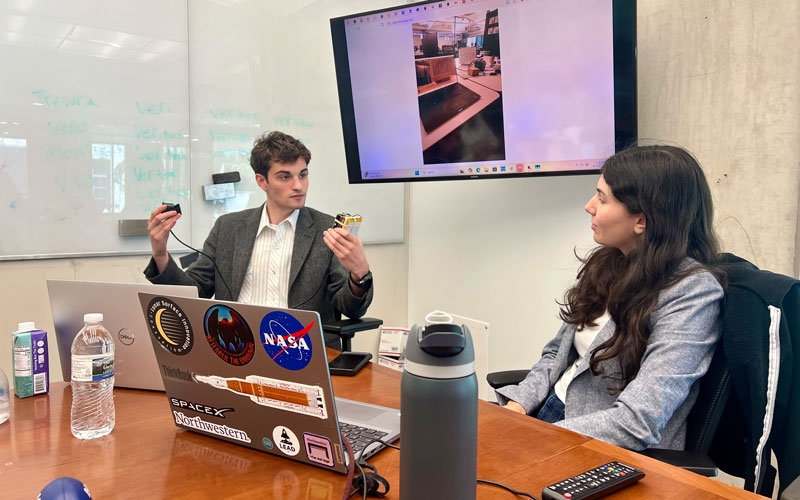Mechanical Engineering Students Develop Startup During Morehead Family Innovator Fellowship
Trevor Abbott (’26) and Victoria Israel (’26) developed HaptE into an optical technology startup tackling warehouse inefficiencies.

This summer, Northwestern Engineering students Trevor Abbott (’26) and Victorial Israel (’26) spent 10 weeks working full time on their startup, thanks to the Morehead Family Innovator Fellowship through the Farley Center for Entrepreneurship and Innovation. The fellowship, now in its second year, supports entrepreneurial students who need time, funding, and mentorship to move their ventures forward.
“The fellowship fills a void that existed for driven entrepreneurial students who have exhausted other resources on campus,” said Hayes Ferguson, Farley Center director and clinical professor. “Trevor and Victoria accomplished more in one summer than many young founders do in a year, and it has been rewarding to see their vision sharpen and their confidence grow.”
Ferguson served as the students’ main mentor and met with the team weekly, while mentors including Farley alum Ana Cornell (’21) and advisory board members Charlotte Oxnam (’23), Casey Qadir (’19), Robert Shaw (’70, MM ’81), and Mark Desky (’88, MS ’90) offered guidance and connections.
Abbott, expected to graduate next spring with a bachelor's degree in mechanical engineering and a certificate from Kellogg School of Management, and Israel, expected to graduate in June with a combined master's and bachelor's degree in mechanical engineering, are the cofounders of HaptE, an optical technology startup tackling warehouse inefficiencies. Over the summer, they shifted their business focus from an earlier concept targeting improved patient outcomes in physical therapy toward a system that uses cameras and computer vision to improve warehouse efficiency, visibility, and accountability.
The students spent much of the summer in Chicago and Evanston warehouses, developing their technology, securing mentors and partners, and identifying pain points in the industry. They learned that while warehouses closely track output metrics like orders picked per hour, managers often lack visibility into why errors happen.

During a presentation to mentors and benefactor Jennifer Morehead (’00, MBA ’08), the students recounted examples of costly mistakes such as a misplaced packet that led to a $1 million shipping bill, a lost shipment that jeopardized a client relationship, and the ongoing difficulty of tracking what happens on the warehouse floor.
“Warehouses are competing tooth and nail for contracts,” Abbott said. “If they make small mistakes, they might lose $1 million contracts. At the end of the day, you can’t improve what you can’t see.”
HaptE’s solution is to deploy cameras — either on forklifts, workers, or other equipment — that use computer vision, optical character recognition, and machine learning to track items as they move throughout warehouses. The system can scan items and flag errors in real time, such as a worker selecting the wrong item, and integrate into existing warehouse management software. Unlike traditional fixed cameras, HaptE’s approach is designed to follow the activity at the source of human and machine error.
Abbott and Israel emphasized that while they’re not reinventing AI, they are applying existing tools to spaces where technological adoption is lagging.
The fellowship wrapped with a final presentation before advisers and Farley Center leadership. The students outlined their process, demonstrated their minimum viable product (MVP) prototype, and discussed next steps. The team also shared that they had secured a pilot warehouse partnership to move their work forward.
“I thank Farley and the Morehead family for this amazing opportunity,” Israel said. “We couldn’t be where we are today without their support.”
